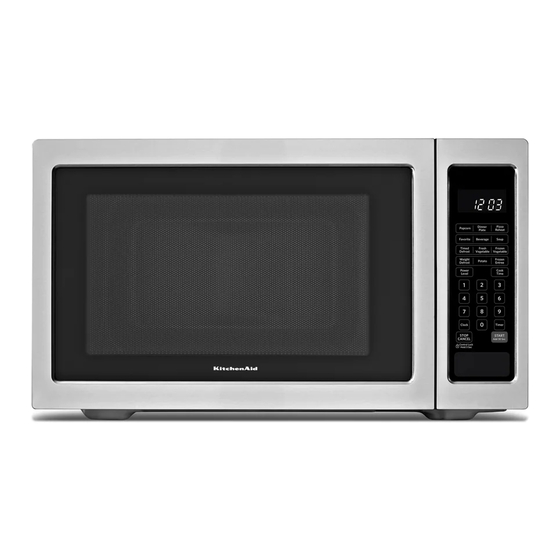- ページ 3
電子レンジ KitchenAid KCMS1655BBLのPDF 取扱説明書をオンラインで閲覧またはダウンロードできます。KitchenAid KCMS1655BBL 16 ページ。 Use & care guide

Your safety and the safety of others are very important.
We have provided many important safety messages in this manual and on your appliance. Always read and obey all safety
messages.
This is the safety alert symbol.
This symbol alerts you to potential hazards that can kill or hurt you and others.
All safety messages will follow the safety alert symbol and either the word "DANGER" or "WARNING."
These words mean:
DANGER
WARNING
All safety messages will tell you what the potential hazard is, tell you how to reduce the chance of injury, and tell you what can
happen if the instructions are not followed.
IMPORTANT SAFETY INSTRUCTIONS
When using electrical appliances basic safety precautions should be followed, including the following:
WARNING:
To reduce the risk of burns, electric
shock, fire, injury to persons, or exposure to excessive
microwave energy:
Read all instructions before using the microwave oven.
Read and follow the specific "PRECAUTIONS TO
AVOID POSSIBLE EXPOSURE TO EXCESSIVE
MICROWAVE ENERGY" found in this section.
The microwave oven must be grounded. Connect only
to properly grounded outlet. See "GROUNDING
INSTRUCTIONS" found in the "INSTALLATION
INSTRUCTIONS" section.
Install or locate the microwave oven only in
accordance with the provided Installation Instructions.
Some products such as whole eggs in the shell and
sealed containers – for example, closed glass jars –
are able to explode and should not be heated in the
microwave oven.
Use the microwave oven only for its intended use as
described in this manual. Do not use corrosive
chemicals or vapors in the microwave oven. This type
of oven is specifically designed to heat, cook, or dry
food. It is not designed for industrial or laboratory use.
As with any appliance, close supervision is necessary
when used by children.
Do not operate the microwave oven if it has a
damaged cord or plug, if it is not working properly, or
if it has been damaged or dropped.
The microwave oven should be serviced only by
qualified service personnel. Call an authorized service
company for examination, repair, or adjustment.
See door surface cleaning instructions in the
"Microwave Oven Care" section.
MICROWAVE OVEN SAFETY
SAVE THESE INSTRUCTIONS
You can be killed or seriously injured if you don't immediately
follow instructions.
You can be killed or seriously injured if you don't follow
instructions.
To reduce the risk of fire in the oven cavity:
– Do not overcook food. Carefully attend the microwave oven
when paper, plastic, or other combustible materials are placed
inside the oven to facilitate cooking.
– Remove wire twist-ties from paper or plastic bags before
placing bags in oven.
– If materials inside the oven ignite, keep oven door closed, turn
oven off, and disconnect the power cord, or shut off power at
the fuse or circuit breaker panel.
– Do not use the cavity for storage purposes. Do not leave
paper products, cooking utensils, or food in the cavity when
not in use.
Liquids, such as water, coffee, or tea are able to be overheated
beyond the boiling point without appearing to be boiling. Visible
bubbling or boiling when the container is removed from the
microwave oven is not always present. THIS COULD RESULT
IN VERY HOT LIQUIDS SUDDENLY BOILING OVER WHEN
THE CONTAINER IS DISTURBED OR A SPOON OR OTHER
UTENSIL IS INSERTED INTO THE LIQUID.
To reduce the risk of injury to persons:
– Do not overheat the liquid.
– Stir the liquid both before and halfway through heating it.
– Do not use straight-sided containers with narrow necks.
– After heating, allow the container to stand in the microwave
oven for a short time before removing the container.
– Use extreme care when inserting a spoon or other utensil into
the container.
Oversized foods or oversized metal utensils should not be
inserted in the microwave oven as they may create a fire or risk
of electric shock.
Do not clean with metal scouring pads. Pieces can burn off the
pad and touch electrical parts involving a risk of electric shock.
3
